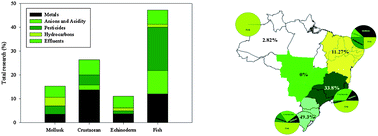Toxicity tests aiming to protect Brazilian aquatic systems: current status and implications for management
Abstract
The current status of toxicological tests performed with Brazilian native species was evaluated through a survey of the scientific data available in the literature. The information gathered was processed and an electronic toxicology database (http://www.inct-ta.furg.br/bd_toxicologico.php) was generated. This database provides valuable information for researchers to select sensitive and tolerant aquatic species to a large variety of aquatic pollutants. Furthermore, the toxicology database allows researchers to select species representative of an ecosystem of interest. Analysis of the toxicology database showed that ecotoxicological assays have significantly improved in Brazil over the last decade, in spite of the still relatively low number of tests performed and the restricted number of native species tested. This is because most of the research is developed in a few laboratories concentrated in certain regions of Brazil, especially in Southern and Southeast regions. Considering the extremely rich biodiversity and the large variety of aquatic ecosystems in Brazil, this finding points to the urgent need for the development of ecotoxicological studies with other groups of aquatic animals, such as insects, foraminifera, cnidarians, worms, amphibians, among others. This would help to derive more realistic


 Please wait while we load your content...
Please wait while we load your content...